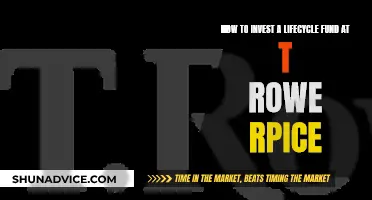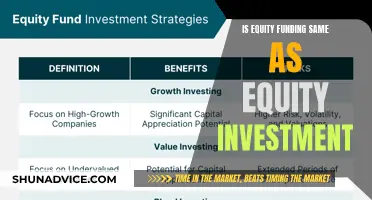
Money market funds are a type of mutual fund that invests in short-term, high-quality, low-risk debt securities. They are considered a safe, liquid, and profitable place to store money for a short period of time, such as an emergency fund or cash reserves. Money market funds are also a good alternative to traditional savings accounts as they have historically provided higher returns.
There are three main types of money market funds: government, municipal, and prime money funds. Each type of fund invests in a specific debt instrument, which determines the fund's risk level, yields, and maturity period. Government money funds, for example, invest in cash, government securities, and fully collateralized repurchase agreements, making them one of the safest options.
To invest in money market funds, you can follow a process similar to investing in stocks: open a brokerage account, determine how much to invest, choose a money market fund, and keep track of your investment. It is important to note that money market funds are not insured by the Federal Deposit Insurance Corporation (FDIC) and are subject to market risks and interest rate fluctuations.
| Characteristics | Values |
|---|---|
| Investment type | Mutual fund |
| Risk level | Low |
| Returns | Lower than other mutual funds |
| Investment strategy | Short-term, low-risk debt securities |
| Examples of debt securities | U.S. Treasury bills, municipal bonds, commercial paper, certificates of deposit |
| Yields | Comparable to high-yield savings accounts |
| Liquidity | High |
| Regulation | U.S. Securities and Exchange Commission (SEC) |
| Taxation | Taxable or tax-exempt, depending on the fund |
| Investor profile | Risk-averse, focused on protecting savings |
| Purchase options | Fund provider, bank, online brokerage account |
| Minimum investment | Varies, can be $0 with certain conditions |
What You'll Learn

Money market funds vs money market accounts
Money market funds and money market accounts are distinct financial tools with different features and benefits. Here is a detailed comparison between the two:
Money Market Funds
Money market funds, also known as money market mutual funds, are investment products that offer a lower-risk alternative to the stock market. They are a type of mutual fund that invests in short-term, high-quality debt instruments, cash, and cash equivalents. Money market funds are not insured by the Federal Deposit Insurance Corporation (FDIC) and are not federally regulated. Instead, they aim to maintain a stable share price, typically $1 per share, and any losses are extremely rare. Money market funds are opened at brokerages and have no minimum deposit requirements or transaction limits. They offer slightly higher interest rates than money market accounts but do not provide immediate access to funds through debit cards or check-writing. Management fees, expressed as expense ratios, are charged on these funds.
Money Market Accounts
Money market accounts, or money market deposit accounts, are interest-earning bank accounts that combine the features of checking and savings accounts. They are FDIC-insured or insured by the National Credit Union Administration (NCUA) for up to $250,000 per depositor. Money market accounts usually offer higher interest rates than traditional savings accounts, sometimes over 5% APY. They often come with tools like debit cards and check-writing abilities, providing easier access to funds. However, there are typically transaction limits of six withdrawals per billing statement period, and fees may apply if these limits are exceeded. Money market accounts have higher minimum balance requirements than other accounts, and interest rates may be tiered based on account balances.
Key Differences
The main differences between money market funds and money market accounts lie in their level of risk, liquidity, and returns. Money market funds offer slightly higher interest rates but carry a small amount of risk as they are not FDIC-insured. On the other hand, money market accounts provide federal insurance and are considered safer, although they usually have higher minimum balance requirements and transaction limits. Money market funds are better suited for quick investment decisions and taking advantage of market opportunities, while money market accounts are ideal for emergency funds and short-term savings goals due to their liquidity and earning potential.
Liquid Funds India: A Smart Investment Guide
You may want to see also

Types of money market funds
Money market funds are typically divided into three categories: government, prime, and municipal.
Government funds invest in cash, US Treasury securities, and repurchase agreements that are collateralized by US Treasury securities. Government Money Funds include Treasury Funds, which invest in standard US Treasury-issued debt securities, such as Treasury bills, Treasury bonds, and Treasury notes.
Prime funds, also known as general-purpose funds, invest in government securities, commercial paper, certificates of deposit, short-term securities issued by domestic and foreign corporations, and repurchase and reverse repurchase agreements. Prime funds may also be issued by corporations, US government agencies, and government-sponsored enterprises.
Municipal funds, also known as tax-exempt funds, invest primarily in tax-exempt securities. Municipal money market funds invest in municipal bonds issued by municipalities and municipal agencies, which pay interest exempt from federal income tax.
Prime and municipal funds are further classified as retail or institutional, depending on the type of investors in the fund. Government funds are extremely safe, as they invest 95.5% of their assets in government-issued securities.
HOA Reserve Fund Investment Strategies: Where to Invest for Growth
You may want to see also

How money market funds work
Money market funds are a type of mutual fund that invests in cash, cash equivalents, and short-term debt securities. They are considered a low-risk investment option and are suitable for those with short-term investment goals or those looking to build an emergency fund.
Money market funds are regulated by the Securities and Exchange Commission (SEC) and are required to invest in short-term debt securities such as certificates of deposit, U.S. Treasury bills, and commercial paper. The funds typically aim to maintain a share price of $1, although this is not always guaranteed.
There are a few different types of money market funds based on the securities they invest in. Prime funds invest in floating-rate debt and commercial paper issued by companies, U.S. government agencies, and government-sponsored enterprises. Tax-exempt funds are made up of municipal bonds and are exempt from federal income taxes and sometimes state taxes. Government and treasury funds invest in cash and securities backed by the government, such as U.S. Treasury bills.
Money market funds are a good option for investors who are risk-averse and focused on protecting their capital. They offer a return that is typically higher than traditional bank savings accounts but with significantly less volatility than stock market investments. Additionally, money market funds allow investors to write checks and make electronic transfers.
It is important to note that money market funds are not FDIC-insured, even when purchased through a bank. While they are considered safe investments, there is still a risk of losing money as they are intended for short-term investments.
Strategies for Investing in DFA Funds Solo
You may want to see also

How to invest in money market funds
Money market funds, also known as money market mutual funds, are a saving and investing option offered by banks, brokerages, and mutual fund companies. They are considered low-risk investments suitable for short-term investment goals or building an emergency fund.
You can purchase money market funds in several ways:
- Go directly to a fund provider such as Vanguard or BlackRock.
- Purchase them through a bank.
- Use an online brokerage account, which will likely offer the most options from different providers.
Things to consider
If you plan to invest in money market funds as part of a retirement strategy, consider purchasing through a traditional or Roth IRA to limit your taxes on gains and withdrawals.
Money market funds are not a way to get rich, but they will provide a small return with low risk, making them a good fit for retirees and those saving for short-term goals or building an emergency fund.
Before investing in a money market fund, carefully read all the fund's available information, including its prospectus and its most recent shareholder report.
Venture Capital's XAI Investment: Who's Leading the Pack?
You may want to see also

Advantages and disadvantages of money market funds
Money market funds are a type of mutual fund that invests in highly-rated, short-term debt securities. They generate income but little to no capital appreciation. Money market funds are considered one of the safest investments with low volatility and are ideal for investors who want to protect their savings. Here are some of the advantages and disadvantages of money market funds:
Advantages:
- Stability and Security: Money market funds are among the least volatile and safest types of investments available. They are required by regulations to invest in short-term, low-risk investments, making them less prone to market fluctuations.
- Liquidity: Money market funds offer high liquidity, and it is generally easy to retrieve funds or settle brokerage account trades.
- Short Duration: Money market funds have a short duration, usually a few months, making them less susceptible to interest rate risk compared to longer-term bond fund investments.
- Diversification: Money market funds hold a variety of different securities, limiting exposure to any single issuer, which helps to diversify an investor's portfolio.
- Potential Tax Advantages: Some money market funds invest in securities that are exempt from federal and state income taxes, providing a source of stable, tax-efficient income.
Disadvantages:
- Low Returns: Money market funds offer low returns that may not keep up with inflation, resulting in a loss of purchasing power. This makes them unsuitable for long-term investment goals.
- No Federal Insurance Protection: Money market funds are not insured by the Federal Deposit Insurance Corporation (FDIC), unlike money market accounts offered by banks. While they are considered safe, there is a slight risk of losing money.
- Expenses: The low returns coupled with annual fees can eat into the profits of money market funds, making it challenging to keep up with inflation.
- Risk of Higher Yields: Fund managers may take on additional risks to obtain higher yields, which might not always be the smartest move depending on investment objectives.
- Limited Wealth Creation: The low returns of money market funds mean that investors might miss out on opportunities for better rates of return, impacting their ability to build wealth over time.
A Guide to Getting Started with Mutual Funds
You may want to see also
Frequently asked questions
Money market funds are mutual funds that invest in high-quality, short-term debt instruments, cash, and cash equivalents. They are considered extremely low-risk investments and are regulated by the Securities and Exchange Commission (SEC). Money market funds are not insured by the Federal Deposit Insurance Corporation (FDIC) and are therefore not as safe as cash.
Money market funds are a good option for investors who are risk-averse and focused on protecting their capital. They offer a higher rate of return than traditional bank savings accounts and have significantly less volatility than investments in the stock market. Money market funds are also highly liquid, allowing investors to access their money quickly when needed.
You can purchase money market funds directly from a fund provider, through a bank, or through an online brokerage account. When choosing a money market fund, consider the type of fund, minimum investment requirements, the expense ratio, and average yield. It is also important to carefully read all the fund's available information, including its prospectus, before investing.







